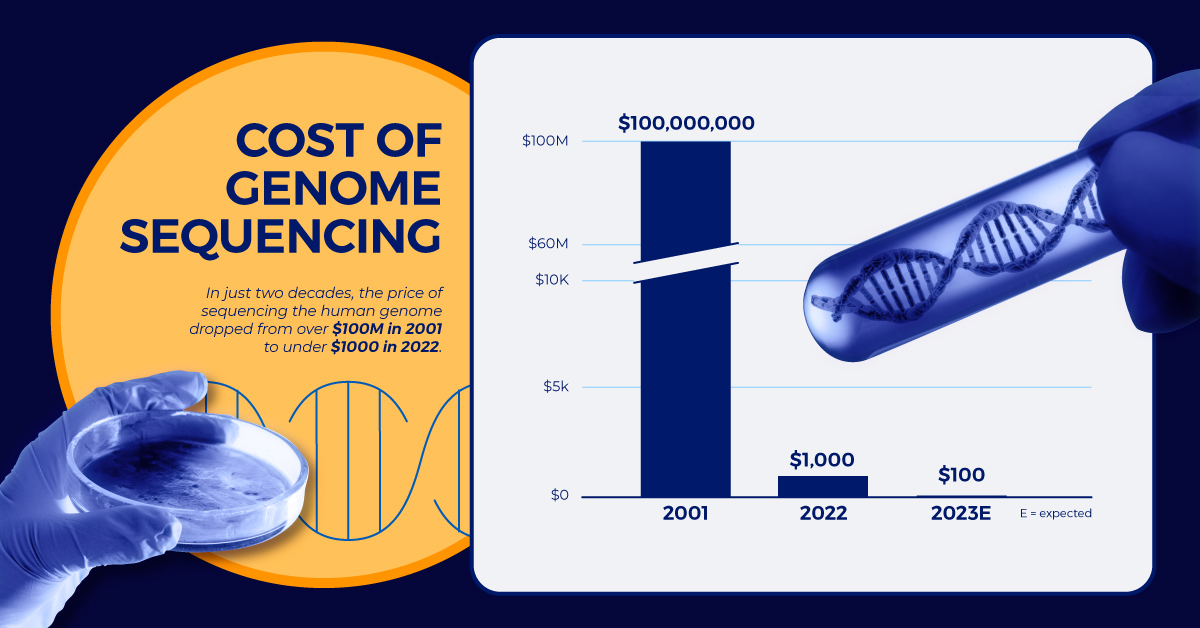Synthetic Biology: Exploring its $4 Trillion Potential
Synthetic Biology: Exploring its $4 Trillion Potential
Synthetic biology combines the principles of engineering and big data with biology to create anything from the vaccines we need to fight disease to life-support systems for cutting-edge spacecraft.
Consequently, the industry is set for rapid growth and could create an economic impact of as much as $4 trillion by 2040.
We partnered with Scottish Mortgage to explore the far-reaching potential of synthetic biology and ask: how can it benefit our world?
How Does It Work?
Synthetic biology is a process whereby the genetic material of a virus, bacteria, plant, or even an animal is altered by introducing synthetic DNA into its biological system. This, in turn, gives the organism its new characteristics.
What Can It Do?
Synthetic biology has the potential to address many problems in a variety of fields, such as:
- Medicine: It allows us to create better vaccines, lessen the effectiveness of antibiotic-resistant microbes, improve cancer therapies, and even create new tissues.
- Environmental Policies: The development of synthetic biology has led to new biofuels and carbon-negative manufacturing. It can also help us to counter corrosion, improving water treatment programs.
- Space Exploration: Synthetic biology has found uses as far away as outer space. It could be used to create a variety of essentials, such as life support systems for spacecraft and radiation-resistant organisms.
- Food and Agriculture: Among its many uses, synthetic biology allows us to create nutrients for plants, disease-resistant crops, and even lab-grown meat.
A Market Snapshot
In 2022, synthetic biology had a market size of $13.9 billion. With consistent innovation, the market is expected to grow at a staggering 28% CAGR to the year 2030, when it will reach a market size of over $100 billion.
But one of the pivotal reasons for the growth of synthetic biology is how cost effective human genome sequencing has become.
The Impact of Affordable Genome Sequencing
Genome sequencing is the process that makes synthetic biology work. It allows scientists to identify and reproduce biological systems artificially. But in 2001, this process cost over $100 million.
Technological advances have reduced this cost to less than $1,000 in 2021, and with the help of AI, some researchers have reduced this cost further to less than $100.
Organic Investment in Artificial Biology
With reduced costs coupled with incredible potential, it is no wonder that investment in synthetic biology has been growing steadily:
| Year | USD Raised |
|---|---|
| 2009 | $0.5B |
| 2010 | $2.1B |
| 2011 | $0.4B |
| 2012 | $0.4B |
| 2013 | $0.8B |
| 2014 | $0.7B |
| 2015 | $2.5B |
| 2016 | $2.1B |
| 2017 | $1.9B |
| 2018 | $4.3B |
| 2019 | $3.1B |
| 2020 | $7.8B |
Growing A Better Future
In the next 20 years, synthetic biology has the potential to benefit our world by overhauling medicine, agriculture, and even space exploration with its myriad applications.
In the next part of the Pioneers of Progress series, we explore digital worlds and learn what life is like in the Metaverse.
Scottish Mortgage offers exposure to the growing synthetic biology industry through companies like Ginkgo Bioworks and Solugen, along with many other pioneers of progress.

Discover how to invest in some of the world’s most innovative companies with Scottish Mortgage today.






